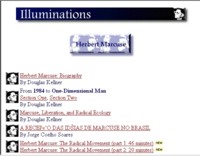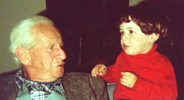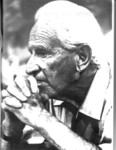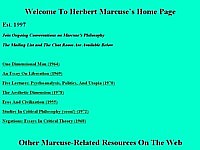| Encyclopedia
Entries (back
to top)
- English
Wikipedia article
about Herbert.
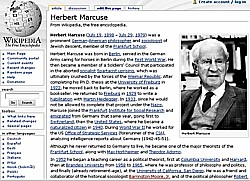 This
is an excellent short text. This
is an excellent short text.
The open source internet encyclopedia wikipedia began
the entry with a 1-liner ("author of One-Dimensional Man")
in Oct. 2001. In October 2002 "Uri" replaced it with the exact
biographical text from my Herbert Marcuse homepage; a photo was added
in April 2003, and wiki-links were added by "JASpencer" in
May 2003. A few substantive additions in June 2003 were slightly erroneous
(see my Feb. 2004 comments under the "discussion" tab at top).
I fixed those mistakes in Feb. 2005.
- German
wikipedia.de page about Herbert,
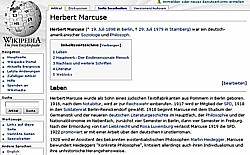 written
mainly by Peter-Erwin Jansen,
is excellent (in German). He started it in Sept. 2003. After numerous
small additiions by others he added substantive discussions of Herbert's
main works on 28 February 2005. written
mainly by Peter-Erwin Jansen,
is excellent (in German). He started it in Sept. 2003. After numerous
small additiions by others he added substantive discussions of Herbert's
main works on 28 February 2005.
- The Literary
Encyclopedia's Marcuse entry was first published in May
2005 by Kelsey Wood, College of the Holy Cross. It offers an excellent,
detailed discussion of both biography and works. On June 15, 2005 I
submitted pages from this site as links to round out that entry.
- The Biographisch-Bibliographischen
Kirchenlexikon's Herbert page site has a detailed entry
(in German) with a good bibliography of primary and secondary works
- It is densely formatted in small font and relatively hard to read,
so I made a reformatted archive
copy with a few explanations and an English translation.
- Philolex.de's Herbert
page has a very short German-language assessment by Peter M�ller,
Berlin. The main text is inserted below. M�ller's Frankfurter Schule
page is worth reading.
Herbert Marcuse
Als Einleitung zu diesem Aufsatz empfehle ich den Aufsatz
über die Frankfurter Schule.
Allgemeines: Herbert Marcuse (1898 - 1979). Deutsch-Amerikanischer
Philosoph jüdischer Abstammung. Während der Revolution 1918/19
Mitglied in einem Soldatenrat. Ursprünglich Schüler Husserls
und Heideggers. Versuchte dann phänomenologische und marxistische
Gedanken zu verbinden. Zu Beginn der Nazi-Zeit in die USA emigriert,
wo er auch nach Ende des 2. Weltkrieges blieb. Wird vielfach der Frankfurter
Schule zugerechnet. Im Gegensatz zu Max Horkheimer und Theodor W. Adorno
engagierte er sich für die Studentenbewegung der späten 60er
Jahre. Wurde zu einem der wichtigsten Theoretiker der Neuen Linken und
der Studentenbewegung (68ff) in vielen Ländern.
Moderne Industriegesellschaften seien geprägt durch Technisierung,
Rationalisierung und Bürokratisierung, sowohl in den kapitalistischen
wie in den real-sozialistischen Systemen. Die Menschen würden durch
"human engineering" gelenkt, lebten in oberflächlichem
Glück, aber wirkliche Opposition und Freiheit gebe es keine mehr.
Die Arbeiter würden ins System integriert. [Das klinkt mir zu sehr
nach Verschwörungstheorie.]
Marcuse rief auf zum "totalen Protest" zur "großen
Weigerung" um kein "eindimensionaler Mensch" zu werden,
der keine Alternativen mehr habe.
Kritik an Ma[r]cuse
Obwohl sich Marcuse in einigen Punkten von den Hauptvertretern der Frankfurter
Schule unterscheidet, trifft die Kritik an der "Frankfurter Schule"
vielfach auch auf ihn zu.
- glbtq
Marcuse page: An Encyclopedia of Gay, Lesbian, Bisexual,
Transgender, and Queer Culture's Marcuse entry was written in March
2004 by Jeffrey Escoffier.
The excellent, in-depth article begins as follows:
German-born philosopher
Herbert Marcuse was one of the leading theorists of the New Left in
Europe and the United States in the late 1960s. Much like Michel Foucault
in a later generation, Marcuse had an enormous influence on theories
of sexual liberation, particularly in the early post-Stonewall gay movement
and on the left.
Many young people in the 1960s adopted Marcuse-like sexual politics
as the basis for the counter-culture's radical transformation of values.
By exploring drugs, music and sex, they sought to experience what Marcuse
described as an "erotic sense of reality."
Marcuse's book Eros and Civilization (1955), a synthesis of the thought
of Sigmund Freud and Karl Marx, also played an influential role in the
writing of early proponents of gay liberation, such as Dennis Altman
and Martin Duberman, and it influenced radical gay groups such as the
Gay Liberation Front's Red Butterfly Collective.
- Initiative
für Praxisphilosophie's Herbert Marcuse page has
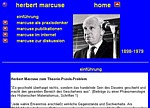 a
commented overview of Herbert's works with links and bibliography (in
German). a
commented overview of Herbert's works with links and bibliography (in
German).
- Microsoft Encarta's
Marcuse page offers the following:
Marcuse, Herbert
(1898-1979), German American philosopher, known as a leading theoretician
of the radical left and New Left and as an incisive critic of the established
order. Born in Berlin, and educated at the universities of Berlin and
Freiburg, he was associated with the Institute of Social Research, Frankfurt,
until 1933, when the National Socialist Party came into power and the
school was closed. Marcuse immigrated to the United States, joining
the Institute of Social Research, Columbia University, in 1934. During
the 1940s he was employed by various intelligence agencies of the federal
government. After 1950 he taught successively at Columbia, Harvard,
and Brandeis universities and at the University of California, San Diego.
Marcuse's influence with student leaders was evident during the university
rebellions in Europe and the U.S. in the late 1960s. In his writings
Marcuse held that some social ills can be overcome only if the democratic
process is discarded. He maintained that the most effective challenge
to the established order will come from students and minority groups
and not from workers, who, he claims, are committed to the status quo.
His social philosophy is set forth in Eros and Civilization (1955) and
One-Dimensional Man (1964).
- Answer.com's
Marcuse page has a dictionary entry, the Columbia 6th ed. and Wiki
entries.
- The British portal tiscali.co.uk's
Marcuse entry has the following:
"Marcuse, Herbert
German-born US political philosopher. His theories combining Marxism
and Freudianism influenced radical thought in the 1960s and 1970s. He
preached the overthrow of the existing social order by using the system�s
very tolerance to ensure its defeat; he was not an advocate of violent
revolution.
Marcuse was born in Berlin and became an influential member of the Frankfurt
School. In 1934 he moved to the USA as a refugee from Hitler�s Germany
and taught philosophy at several universities, including Columbia 1934�40,
Brandeis 1954�65, and the University of California at San Diego 1965�79.
He wrote several books, including Eros and Civilization (1955) and One-Dimensional
Man (1964)."
- 21stcenturyschools.com
has a brief timeline biography in table form
- Penguin
Dictionary of Sociology Marcuse entry
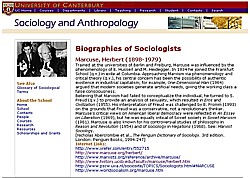 was
put on the web by the Sociology & Anthropology department of the
University of Canterbury, New Zealand. was
put on the web by the Sociology & Anthropology department of the
University of Canterbury, New Zealand.
- The University of Amsterdam's SocioSite Project has
entries for Marcuse,
and Habermas
(among others).
- PhilosophyPages.com
Marcuse blurb and links (scroll down). By Garth Kemerling, in Oct.
2004 this had last been updated in August 2002. It has definitions of
concepts like "alienation," recommended readings, and a few
links. (added 10/4/04)
- A&E
biography Marcuse page has the following text from crystalreference.com:
"Marxist philosopher,
born in Berlin, Germany. He studied at Berlin and Freiburg, and became
an influential figure in the Frankfurt School. He fled to Geneva in
1933, and after World War 2 moved to the USA, working in intelligence.
He later held posts at Columbia (1951), Harvard (1952), Brandeis (1954),
and California, San Diego (1965-76). His books include Reason and Revolution
(1941), Eros and Civilization (1955) and, more famously, One Dimensional
Man (1964), condemning the �repressive tolerance� of modern industrial
society which both stimulated and satisfied the superficial material
desires of the masses at the cost of more fundamental needs and freedoms."
- Free
On-line Dictionary of Philosophy (FOLDOP)'s Marcuse page reads as
follows:
<biography, history of philosophy> german-american
political philosopher associated with the Frankfurt School (1898-1979).
Author of Eros and Civilization (1955) and One-Dimensional Man (1964).
Marcuse combined Marx's economic analysis with Freudian psychology in
an effort to show that a fundamental social transformation could liberate
individual human beings from the alienation and repression that characterize
patriarchal capitalist societies.
Recommended Reading:
Herbert Marcuse, Towards a Critical Theory of Society, ed. by Douglas
Kellner (Routledge, 2001);
Joan Nordquist, Herbert Marcuse: A Bibliography (Ref. and Res. Serv.,
2000);
Douglas Kellner, Herbert Marcuse and the Crisis of Marxism (California,
1992);
Marcuse, ed. by Robert Pippin, Andrew Feenberg, and Charles P. Webel
(Greenwood, 1987);
Charles Reitz, Art, Alienation, and the Humanities: A Critical Engagement
With Herbert Marcuse (SUNY, 2000).
- BrainyEncyclopedia.com's
Herbert entry is the verbatim biography text taken from the homepage
on this site (marcuse.org), with Wikipedia-style hyperlinks. It was
first found by the internet
archive in October 2004. That earlier entry was again my text from
this site, but with the additional final paragraph that was added to
an early version of the English Wikipedia entry.
- Douglas Kellner's Encyclopedia entries (not available
on the internet)
- Douglas Kellner, "Herbert Marcuse,"
"The Frankfurt School," The Social Science Encyclopedia
(London: Routledge, 1985), 349-350, 483.
- Douglas Kellner, "Herbert Marcuse,"
The Concise Encyclopedia of Western Philosophy and Philosophers,
edited by J. O. Urmson and Jonathan Ree (London: Unwin Hyman, 1989),
191.
- Douglas Kellner, "Herbert Marcuse,"
in: Routledge Dictionary of Twentieth-Century Political Thinkers,
edited by Robert Benewick and Philip Green (London: Routledge 1993),
149-152.
- Douglas Kellner, "Herbert Marcuse,"
in: Leaders from the 1960s, edited by Daniel De Leon. (Westport,
Conn.: Greenwood Press, 1994), 563-569.
- Douglas Kellner, "Herbert Marcuse,"
Scribner Dictionary of American Biography (New York: Charles
Scribner & Sons), 506-508.
- Douglas Kellner, "Herbert Marcuse,"
Oxford Dictionary of Philosophy (Oxford University Press,
?1997).
- Douglas Kellner, "Herbert Marcuse,"
Encyclopaedia of Aesthetics, Michael Kelly, editor, (Columbia
University Press, ?1997).
- Bookrags.com
- Stanford Encyclopedia of Philosophy's Herbert Marcuse page
- Written by Arnold Farr (Univ. of Kentucky), first published Wed Dec 18, 2013.
- Prints on about 23 pages. Here is the table of contents:
1. Biography
2. The Aesthetic Dimension
3. The Search for a Philosophical Foundation for Marxism and the Radical Subject 3.1 Phenomenological Marxism 3.2 Philosophical Anthropology and Radical Subjectivity: 3.3 Negative (Dialectical) Thinking and Social Change:
4. Psychoanalysis and Utopian Vision: 4.1 The Historical and Social Nature of Human Drives 4.2 Repression: 4.3 Eros and Logos 4.4 The Ideology of Scarcity 4.5 Fantasy, Utopia, and the Rationality of Gratification
5. One-Dimensional Thinking and the Democratic Rejection of Democracy
6. The Dialectic of Technology
7. The Specter of Liberation: The Great Refusal and the New Sensibility
8. Marcuse and Feminism
Bibliography; Primary Sources; Secondary Sources; Other Works Cited; Academic Tools; Other Internet Resources; Related Entries
|
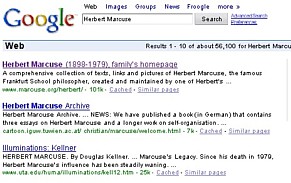 screenshot of Google
results, October 2004
screenshot of Google
results, October 2004
